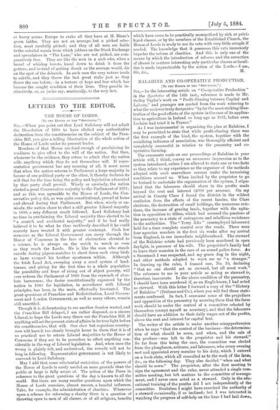LETTERS TO THE EDITOR.
THE HOUSE OF LORDS.
[To THE EDITOR OF THE " SPECTATOR."]
Sta,—When you point out that Lord Salisbury will not admit the Dissolution of 1880 to have elicited any authoritative declaration from the constituencies on the subject of the Fran- chise Bill, you give a telling illustration of the whole action of the House of Lords under its present leader.
Members of that House are fond enough of proclaiming its readiness to give effect to the will of the nation. But then, whatever be the evidence, they refuse to admit that the nation wills anything which they do not themselves will. If repre- sentative government has any meaning at all, it must mean that when the nation returns to Parliament a large majority in favour of one political party or the other, it thereby declares its will that for the time being the policy and legislation advocated by that party shall prevail. Wisely or unwisely, the nation elected a great Conservative majority to the Parliament of 1874; and as this was agreeable to the House of Lords, the Con- servative policy did, as was quite constitutional, prevail at home and abroad during that Parliament. But when, wisely or un- wisely, the nation chose to elect a still greater Liberal majority in 1830, P. very different result followed. Lord Salisbury lost no time in proclaiming the Liberal majority thus elected to be "a scratch and accidental majority," and if he had really believed it to be what he thus recklessly described it he could scarcely have treated it with greater contempt. Such few measures as the Liberal Government can carry through the House of Commons in the face of obstruction elevated to a science, he is always on the watch to wreck as soon as they reach the Lords. He is like the man who stands outside during pigeon-matches to shoot down such stray birds as have escaped his brother sportsmen within. Although the Irish Land Act, sweeping away a cruel system of land- tenure, and giving for the first time to a whole population the possibility and hope of rising out of abject poverty, will ever redeem the Parliament of 1880 from the reproach of abso- lute barrenness, the desire constitutionally expressed by the nation in 1880 for legislation, in accordance with Liberal principles, has been, in the main, effectually frustrated. The great questions of Franchise and Redistribution, Local Govern- ment and London Government, as well as many others, remain still unsettled.
Though it is disheartening to see another Session wasted, and the Franchise Bill delayed, I am rather disposed, as a sincere Liberal, to hope the Lords may throw out the Franchise Bill. If anything will set the present state of affairs in its true light before the constituencies, that will. Our slow but sagacious country. men will have it too clearly brought home to them that it is of no practical use to return Liberal majorities to the House of Commons if they are to be powerless to effect anything con- siderable in the way of Liberal legislation. And, when once the wrong is plainly felt, and understood, the remedy will not be long in following. Representative government is not likely to succumb to Lord Salisbury.
May I add that some substantial restriction of the powers of the House of Lords is sorely needed on more grounds than the public at large is fully aware of. The action of the Peers in reference to the great questions of the day is known to all the world. But there are many smaller questions upon which the House of Lords exercises, almost unseen, a baneful influence. Take, for example, the administration of charities. Whenever upon a scheme for reforming a charity there is a question of throwing open to men of all classes, or of all religions, benefits which have come to be practically monopolised by rich or privi- leged classes, or by the members of the Established Church, the House of Lords is ready to use its veto with very little scruple if needed. The knowledge that it possesses this veto immensely impedes the reform of charities. And this is only one of the means by which the introduction of reforms and the correction of abuses in matters interesting only particular classes or locali- ties is made impracticable by the action of the Lords.—I am,










































 Previous page
Previous page